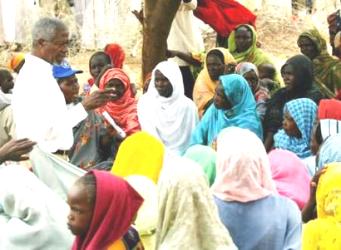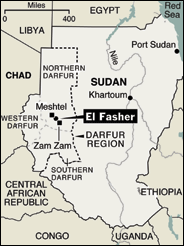Refugees moved before Annan visit to a camp in W. Sudan

– By Emily Wax, The Washington Post
– Friday, July 2, 2004; Page A01
MESHKEL, Sudan, July 1 — After U.N. Secretary General Kofi Annan visited one of the best-maintained refugee camps in this war-rattled region of western Sudan on Thursday, he climbed back into an SUV and headed down a bumpy desert road.
He was scheduled to tour a scene of even greater desperation in what has been called the worst humanitarian crisis in the world, this time a camp that has not received any international aid.
 But when his convoy arrived at the settlement, the 3,000 people who had been living there Wednesday afternoon were gone. Instead, there was only a muddy field with a few soldiers stepping through the muck.
But when his convoy arrived at the settlement, the 3,000 people who had been living there Wednesday afternoon were gone. Instead, there was only a muddy field with a few soldiers stepping through the muck.
In a move that befuddled U.N. officials, the Sudanese villagers in the camp were moved overnight and in the morning, said Jan Egeland, the U.N. undersecretary general for humanitarian affairs. They were loaded into government trucks “apparently to be dumped,” he said, at the gates of the already overcrowded Abu Shouk camp, 12 miles away, where 40,000 people live in a stretch of open desert. A U.N. team confirmed that the villagers had been moved to Abu Shouk.
The Sudanese government’s social affairs minister, Ahnoun Mohammed Ebrahim, said the villagers were moved to protect them from possible flooding and disease in the low-lying area when the seasonal rains come. He dismissed suggestions that they were transported to lessen the impact of the crisis for Annan’s visit to the Darfur region, where more than 1 million people have been left homeless by a government-backed Arab militiamen terrorizing the area.
“Every day we move people,” Ebrahim said to reporters.
But Egeland said: “I can’t imagine why they were spontaneously moved. Probably these people will be back tonight.”
U.N. officials conceded that upcoming rains could threaten the area, but also said the government was aware that Abu Shouk was too crowded to accept more refugees.
“Of course it’s a concern,” Annan said, referring to the movement of the refugees at Meshkel camp. “We are trying to sort it out. The team on the ground is following it up actively.”
The movement of the refugees highlighted an ongoing concern among aid workers here that the government is working hard to play down the crisis in Darfur as a string of high-level international delegations arrive.
Secretary of State Colin L. Powell, who visited Abu Shouk on Wednesday, said any efforts to cover up the crisis were ultimately futile because he had a clear picture of what was going on. He stressed at a news conference after visiting the camp that the Arab militias, known as the Janjaweed, “had to be broken,” and he said the government in Khartoum must take action “within days or weeks” to deal with the crisis. The United States began circulating a draft U.N. resolution Wednesday that would place sanctions on the militiamen and ban the Sudanese and other governments from arming, equipping or training them.
During his visit, Annan also emphasized that security was the top priority and told the governor of El Fasher it was vital to assure the displaced villagers that no one would force them to return home without guarantees of protection from the marauding Arab militias. Annan traveled to neighboring Chad on Thursday night to meet with officials about the conflict, which has spilled over the border. About 150,000 Sudanese refugees have left Darfur for Chad.
The search for land is one of the main factors behind the violence in Darfur. Farming tribes that largely view themselves as African have long clashed with the Arab tribes, which are predominantly camel herders. The current conflict began when two African groups attacked military installations in early 2003, saying that the Arab central government had failed to develop the area. The government responded by arming the Arab militias and bombing villages, causing an exodus of civilians, according to the United Nations and human rights groups. An estimated 30,000 people have been killed in the conflict.
“The massacres have stopped. But there is still killings and rapes. The only thing there is an abundance of in Darfur is weapons,” Egeland told reporters traveling with Annan.
Later, Egeland said that if Sudan’s government could not disarm the militias, the crisis would “go on forever. The next few months will be a moment of truth for Sudan.”
Ibrahim Mahmoud Hamid, Sudan’s humanitarian affairs minister, said the camps were safe and free of attacks. “From my knowledge there is no such phenomenon,” he said.
On Thursday when Annan visited Zam Zam camp, 11 miles south of El Fasher, no militiamen were in sight. Smiling and waving women riding donkeys lined the road to the camp to greet him. But on Sunday, the Janjaweed roamed the area, riding horses and camels while cradling guns.
Annan requested a private meeting with a group of women in the camp. In contrast to other discussions Annan had throughout the day, government representatives were kept away as he sat on a straw mat under a tree and quietly asked the women about their lives since the crisis began.
“We lost our houses. They were burned. Some of the Janjaweed rode horses and camels using guns, and then there were bombs,” one woman said.
Another woman said her sister was riding a donkey when her village was bombed.
“Her body was divided in half,” she said. “Now I must care for her 11 children.”
A midwife said she knew of 20 rape victims at the camp.
Annan told the women: “Most of you want to go home as soon as possible. What does the government have to do to make that happen?”
Several women replied, “Security.”
“I agree with you. . . . Nobody is going to force you to go home without security,” Annan said, touching his heart. “As long as you are in this camp we are going to do everything we can to protect you.”
The women clapped and called out in Arabic, “God willing.”
